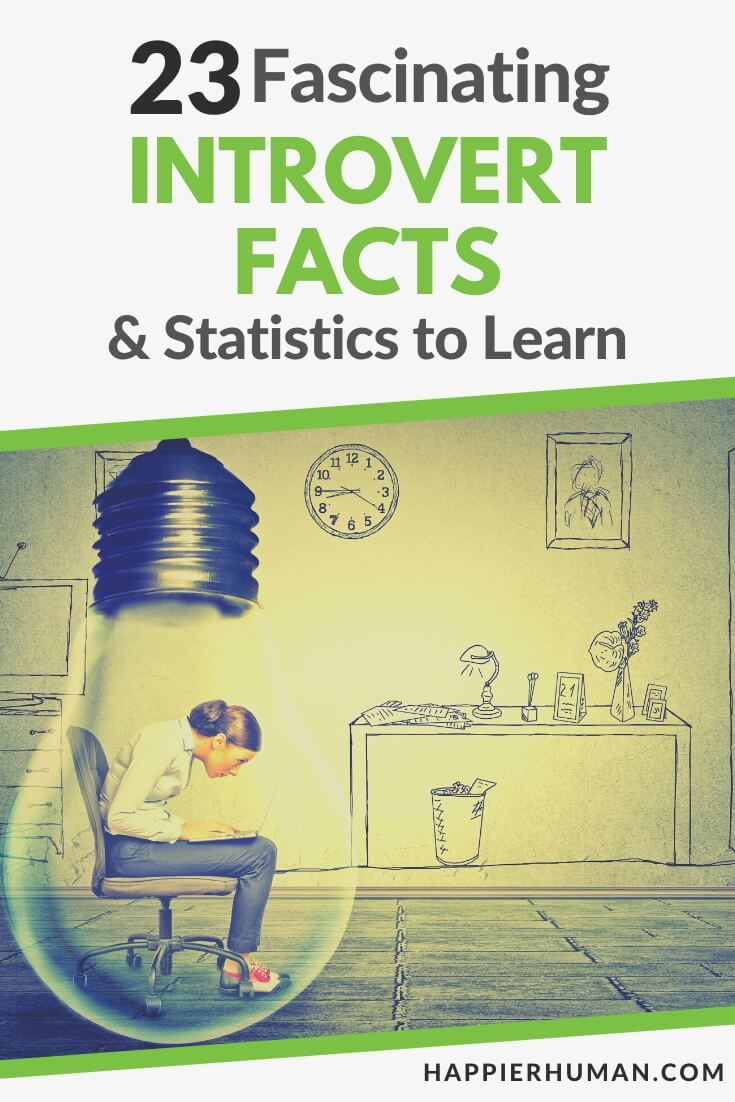When most of us hear the word “introvert”, our minds automatically shift to thoughts of someone who is antisocial or shy… perhaps even rude. Yet, after years of research and writing on this topic, I’ve come to the realization that these are misconceptions.
While introverts do like their space, it is not because they don’t crave the company of others. And it is not because they simply don’t like people or think they are better than everyone else.
There is a method to their “madness”, as you will, and today we are going to provide a list of 23 introvert facts to set the record straight and help you get a better understanding of the yin to an extrovert’s yang.
Fact #1: There are 4 primary types of introverts: restrained, social, anxious and thinking.
Just when you thought it was black and white, research has revealed that there are multiple types of introverts. Four to be exact. And within those four types, there are varying personality types.
Long gone are the days of “pigeon holing” folks into simply being “outgoing” or “shy”… introvert vs extrovert.
According to Jonathan Cheek, a professor of personality psychology at Southern Methodist University in Dallas, “all people have one basic type of introvert they are most comfortable with.” These include:
As you can see, introverts do walk among us and even dare to converse… they just simply prefer to choose how and when to do so. Things must be done on their terms.
Fact #2: Introverts bask in the gloom of rainy days, in part because it mimics white noise that has a soothing effect.
Rainy days have been said to have a very calming effect on introverts. Experts believe there are a few reasons for this. Among them, the most obvious is that rain hints at the possibility of plans being canceled.
And, as we all know, many introverts love the opportunity for some down time… a chance to snuggle under a blanket and read a good book or binge watch their favorite show in peace.

Another theory, backed by research, suggests that introverts find white noise to be soothing, and the pitter patter of rain on the sidewalk or window mimics that. This gives an introvert the ability to think more clearly and stay focused.
Fact #3: Introverts have trouble shutting off their brains, as their minds are constantly processing and analyzing information and thoughts.
Introverts are deep thinkers. While they may not always be the first to raise their hand in class or volunteer for a work project, it is not for a lack of knowledge or being capable.
In fact, according to an article on PsychMechanics, it’s rare that you’ve come across a deep thinker that wasn’t an introvert. Mainly because introverts prefer to recharge themselves by having some “me time”… which equates to them spending most of their time in their own head, constantly analyzing the information they’re exposed to.
So the next time you look at a person and assume they are daft or unmotivated, don’t. Instead, get to know them and consider the possibility that they are simply plotting their next move or calculating a solution.
Fact #4: Introverts are extremely creative and behind some of the most amazing works of art in the world.
Due to the fact that many of them are described as quiet, shy and sensitive types…it should come as no surprise that introverts are often the creators of some of the most amazing works or art in the world – be it music, sculpture, painting or writing. Some may even consider their behavior to be that of a recluse.
J.D. Salinger, Stanley Kubrick, Syd Barrett and Vincent Van Gogh are perfect examples of recluse introverts turned artists. Introverts value time to themselves to create and take pleasure in the simplicity of art.
Some have even touted them as having creative superpowers that should be revealed for all the world to see.
Fact #5: Introverts will avoid certain jobs that force them into situations that make them uncomfortable or involve public speaking.
Because they prefer to tread water well within the confines of their comfort zone, introverts are not likely to pursue a career that would jeopardize that.
Jobs that require lots of social interaction, strict deadlines or public speaking are the types they would avoid… not because they are scared, but because it would create unnecessary pressure and anxiety.
Some of the careers that appeal to introverts include:
Jobs such as these are pretty much solo or small group operations. This allows the introvert the flexibility to work at their own pace (within reason) and have some control over their interactions with others.
Fact #6: Introverts are self-aware and listen to their body and mind’s cues that it’s time to reset and recharge.
Many people struggle with the concept of self-awareness. We are in such a hurry most of the time that we rarely stop to check in with ourselves and pay attention to what our minds and bodies crave.
This is why so many people suffer from mental and physical health disorders. And the solution? Take meds. Diet. Exercise. While those things are helpful and sometimes necessary, it’s also true that some things can be cured or even prevented by taking time for self-care.
Many introverts seem eager to trade “happy hour” with friends for quiet time at home, but it’s not because they don’t enjoy the company of others. Rather, they are taking time to recharge their batteries.
This level of self-awareness also tells them that a certain situation might make them anxious or uncomfortable… so they simply won’t engage.
Introverts understand, perhaps better than anyone, what is good for them emotionally and physically. And they have zero guilt about declining invites if their spidey senses are tingling.
Fact #7: Introverts aren’t easily distracted because they use their brains differently, utilizing more brain activity than extroverts, whether they are in a resting state or engaged in a task.
Introverts are always thinking, processing and calculating… and doing so requires intense focus.
Once they are locked into someone or something, it’s hard for them to break away. And it all comes down to how their brains are wired.
They use their minds differently than an extrovert, in part because they don’t care to be the center of attention. That is why introverts make great listeners and are natural leaders.
Fact #8: Introverts are calculated risk takers and will make a mental pro/con list the second a risk is proposed.
Contrary to popular beliefs, introverts aren’t afraid or adverse to taking risks. That said, they are not going to walk blindly into any situation and will take time to weigh the pros and cons. If they don’t stand to benefit from a situation, they are likely to take a hard pass.
Calculated risks require observation and introspection. The introvert will make a decision once she gathers all the facts and processes them. This is particularly true in the workplace. However, it can also apply to personal risks.
An introvert won’t just marry someone based on their looks or financial success. They will instead look for someone that compliments them and who will mutually benefit from the union.
Their friendships will also be selective, as they will choose to have a handful of close friends who accept them for who they are.
Fact #9: Introverts do need time alone to avoid emotional unraveling, ie. the “introvert hangover”.
I think we all know this one. Introverts don’t just prefer to be alone at times… they need it. If an introvert is never given down time, they will start to unravel emotionally. It’s referred to as an “introvert hangover”.
An “introvert hangover” is that drained, tired, overwhelmed feeling you get when you've overdone socializing and have not had enough alone time to recharge. It can come from small group interactions, overstimulation from the activity itself or even a teleconference.
I’m not sure this term is reserved for introverts alone, as I’ve experienced burnout from time to time… but non introverts may just refer to it as needing some “down time”.
The introvert, however, needs it more. Research suggests it has something to do with their level of sensitivity to dopamine, a neurotransmitter in our brain that regulates pleasure and excitement.
Fact #10: Introverts prefer smaller gatherings, otherwise a “fight or flight” response may kick in when they feel things are out of their control.
Introverts will hang out. Believe it or not, they may even extend the invitation to do so. The catch is, once again, it will be on their terms. This means that it will be smaller and more intimate than an extravert’s idea of fun time out.
For an introvert, dinner with a good friend or heading out for a hike with a couple of them, makes for a good time. Research suggests that when introverts and extroverts are in social situations, they respond differently due to biological reasons.
In this case, an introvert will give off a fight or flight response in social situations, due to an alarm trigger in their nervous system.
Fact #11: Introverts do have fun, but their idea of fun may differ depending on the activity. Their hobbies need to be scalable to fit into their comfort zone.
Introverts have fun all of the time… it’s not reserved for just extroverts. The key to understanding “how” is to get to know what their idea of fun is.
For starters, it may surprise you that the majority of introverts can find fun in many of the same activities that extraverts engage in.
I have introvert friends that love riding roller coasters, kayaking, going out to eat and seeing a live show… things I find enjoyable as well. Similarly, simpler things like eating junk food while binge watching a netflix series can also bring them great enjoyment.
Fact #12: Not all introverts are shy, but they will save revealing their true selves for the people they feel most comfortable around.
I have this one friend who I first met while volunteering for an event at our kids’ elementary school. She was the Vice President of the HSA (Home and School Association), super artistic and bubbly. She also had amazing style for a mom. She was not shy.
As we got to know each other better, I asked her to join some friends and I for a night out. She politely declined. Months later, I invited her and her husband to play bar trivia with some other couples… and she again declined.

Then one day, she invited me on a hike. She explained to me that she was a closeted introvert and it made perfect sense. She didn’t accept my invitations to hang out because she didn’t know the other people, and that would mean stepping out of her comfort zone.
But why was she so magnetic at the school event the first time we met? That version of my friend didn’t match up with what I thought an introvert was.
Being an introvert means the outer world drains you and the inner world recharges you, while being shy means you get nervous and self-conscious in social situations. There is a difference.
Fact #13: Not all introverts suffer from anxiety. On the contrary, being intuned with their needs helps them remain quite calm and avoid unnecessary drama.
If you are an introvert, you’re likely comfortable in your own skin. You say no to invitations that don’t interest you and have little guilt over it.
And because you spend so much time alone, you are likely far removed from the day-to-day drama that many of us deal with. Drama that is often unnecessary or self-inflicted. Your days are as chill or as exciting as you want them to be, which means you likely have little to no anxiety.
While some introverts do suffer from the disorder, many don’t. They are simply happy in their little bubble that they occasionally let someone pop.
Fact #14: Introverts don’t lack self-esteem and they don’t put on airs. They accept themselves for who they are and expect others to do the same.
While they may seem reserved much of the time, and rarely if ever crave the spotlight, is it not due to a lack of self-esteem. On the contrary, introverts know exactly who they are and what they want in order to be happy.
They are comfortable in their own skin and don’t try to be someone they aren’t.
It is a common belief that extroverts are more outgoing, therefore must have higher self-esteem; but, what about those extroverts that behave that way to cover up their hidden insecurities?
Studies revealed that introverts with high social engagement have higher self-esteem than introverts with low social engagement.
Basically, if they are enjoying the company of others (even in one-on-one or small group settings) on a regular basis, they likely aren’t lacking self confidence.
Fact #15: Introverts don’t need to be rescued or “reformed”. Doing so will force them out of their comfort zone and can prove detrimental to their psyche and attempted social interactions.
An introvert isn’t a damsel in distress that needs to be saved by her extrovert knight in shining armor.
Introverts don’t need a healer to change the way they interact with others, think or behave in general. In fact, forcing them out of their comfort zone can be dangerous for their mental health.
Introverts are happy little clams living in their ocean of solitude. They have jobs they enjoy, a close circle of friends and deep relationships. In fact, highly sensitive introverts have been known to be “rescuers” in their own right.
Their empathy is a significant part of who they are. Not only are they deeply moved when they witness the suffering of others, but they can actually feel their pain.
Fact #16: Introverts don’t react quickly to change, only information. They monitor change very slowly to make sure things go according to plan.
Ever have someone say to you, “I need a minute.”? Everyone needs extra time to process things now and again, but introverts really need it.
If a change is proposed to them, they will want to play out all of the scenarios in their head before moving forward.
Studies show that extraverts are better able to monitor the events going on around them and seem particularly programmed to register changes, whereas introverts react to change more slowly and less intensely.
This is not because they are afraid, they are simply calculating and processing the information.
Fact #17: Introverts despise small talk and idle chit chat, primarily for fear of running out of things to say.
It is a fact that introverts can’t stand small talk. It likely has something to do with their fear of running out of things to say or being seen as boring.
Introverts are deep thinkers and take time to process their thoughts and words. They want to be viewed as interesting in order to make up for the fact that they enjoy keeping to themselves.
Fact #18: An introvert’s actions and reactions are often misunderstood, thanks to conventional stereotypes.
When an introvert declines an invitation or doesn’t volunteer for a fundraising event, it is easy for us to assume the worst about them. We assume they are lazy or snobbish. These are common misconceptions.
If an introvert doesn’t react to bad news right away, it’s not because they don’t care. They are processing it at a slower rate is all. Everything we think about introverts can be argued. Introverts are misunderstood due to the negative stereotypes along with unawareness of the introversion spectrum and the pressure of society to abide by extroverted characteristics.
Fact #19: Introverts are not lazy, they just won’t put themselves at risk of emotional burnout or general discomfort. This way, they come through when it counts.
I’ve already touched on this, but it’s worth repeating. Introverts are not generally lazy. I mean, of course some may be… after all, they are human.
That said, the reason we believe that introverts are lazy is they aren’t typically the first ones to jump at a chance to help a friend move or run a charity 5K.
They don’t often want to be the lead on a work project or speak at a friend’s retirement party. These are more of the common misconceptions we have of introverts.
But it is their need to recharge their batteries that stops them from jumping into situations too soon, which can also be supported by biological evidence.
Fact #20: Introverts are amazing listeners because their listening to talking ratio is higher than most people.
Because an introvert doesn’t care to speak first and doesn’t crave the spotlight, they are generally reserved. This means they are happy to hear what someone has to say, and will really listen.
Nancy Ancowitz, a career coach specializing in presentations and author of Self Promotion for Introverts, believes that an introvert’s “…listening to talking ratio is higher. They tend to be processing things quietly in their head as opposed to out loud, which adds noise to the conversation.”
Fact #21: Introverts are loyal friends because they carefully select who they choose to spend their precious “social” time with, something they don’t take lightly.
Introverts think things through. Not just when it comes to work or social situations, but they also carefully select who they choose to spend their time with.
How they spend their free time is extremely important to an introvert. They know when they need to be alone and they know when they crave some company.

Every moment counts if you’re an introvert, so they would never waste time with someone who doesn’t add value or quality to their life.
If you are friends with an introvert, you likely have a friend for life. One who is loyal, a great listener, supportive and is not quick to pass judgements. They give carefully thought out advice and will be there in your time of need.
Fact #22: Introverts use a different side of their nervous system, called the parasympathetic.
When we talk about a person’s personality or talents, you will often hear people refer to someone as being “left brained” or “right brained”.
If you're mostly analytical and methodical in your thinking, the theory says that you're left-brained. If you tend to be more creative or artistic, you're right-brained.
But there is so much more to humans than that. The nervous system includes the brain, spinal cord, and a complex network of nerves. This system sends messages back and forth between the brain and the body. The brain is what controls all the body's functions.
Acetylcholine triggers the hypothalamus to send messages to the parasympathetic nervous system to conserve energy.
This system slows the body down, allowing introverts to contemplate and examine the situation. If a decision is made to take action, it will require conscious thought and energy to get the body moving.
Fact #23: Introverts have higher cortical arousal (speed and amount of brain activity).
Higher cortical arousal means introverts have a tendency to process more information per second. Therefore, they will generally avoid highly active environments.
This all plays part in their disdain for small talk, noisy places and large group settings. Being an introvert is about more than a personality type or one’s personal preferences. For them, having time to unwind and recharge is a biological necessity.
Final Thoughts on Introvert Facts
If you’ve read this article, you are either an introvert making sure I got the facts straight… or you are in a relationship with an introvert (professional or personal) and want to understand them better.
Introverts are intelligent and thoughtful. They make great leaders and wonderful friends… you just need to take the time to get to know them and respect their needs.
If you have an introvert friend or colleague that you’d like to engage more deeply with, then be sure to check out our article on hobbies you can do together that may peak their interest.
Finally, if you want to identify YOUR personality type, then take one of these 11 personality tests to better understand what makes you tick.

Nicole Krause has been writing both personally and professionally for over 20 years. She holds a dual B.A. in English and Film Studies. Her work has appeared in some of the country’s top publications, major news outlets, online publications and blogs. As a happily married (and extremely busy) mother of four… her articles primarily focus on parenting, marriage, family, finance, organization and product reviews.


